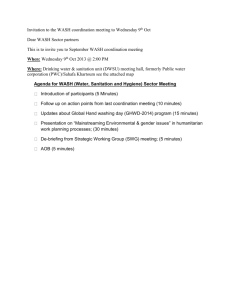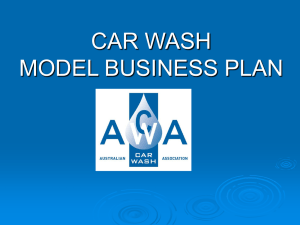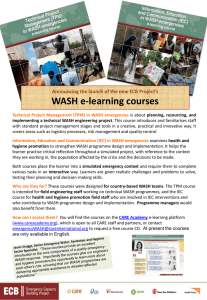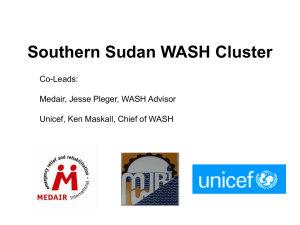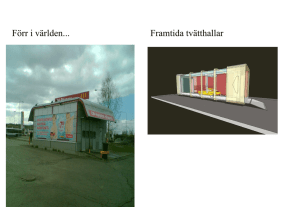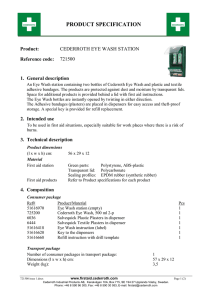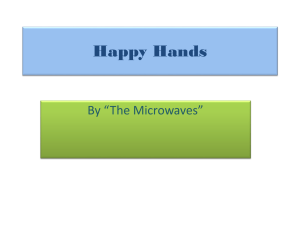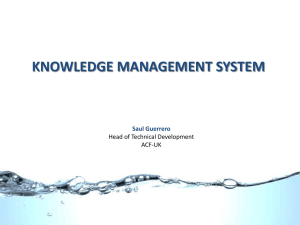Working at the car wash
advertisement
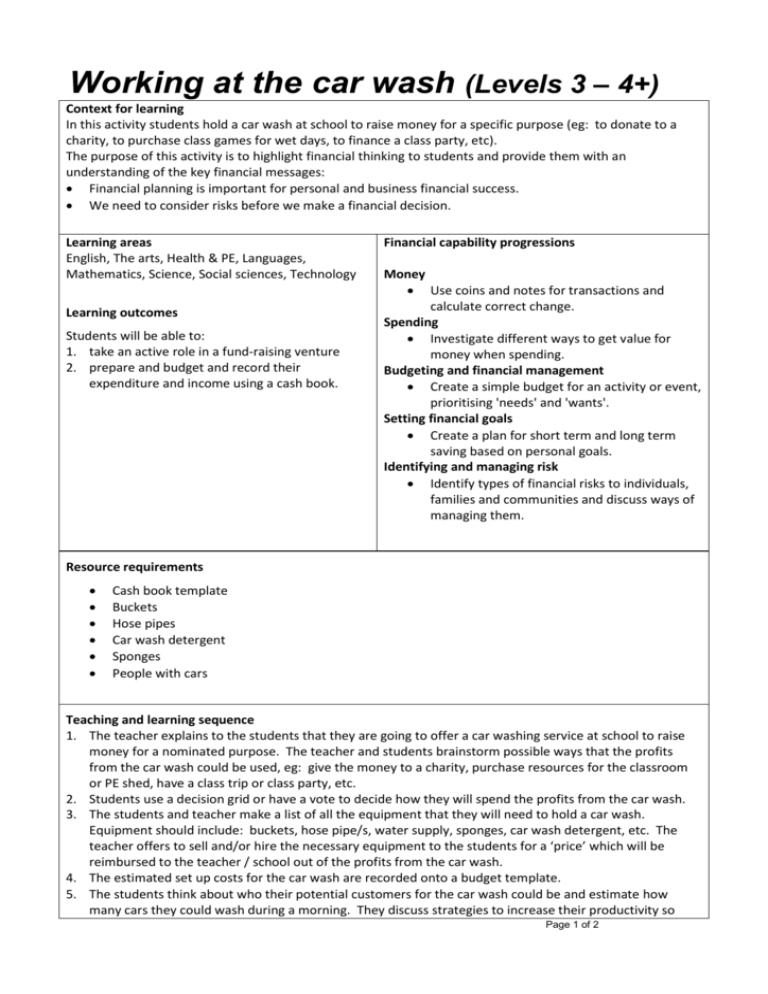
Working at the car wash (Levels 3 – 4+) Context for learning In this activity students hold a car wash at school to raise money for a specific purpose (eg: to donate to a charity, to purchase class games for wet days, to finance a class party, etc). The purpose of this activity is to highlight financial thinking to students and provide them with an understanding of the key financial messages: Financial planning is important for personal and business financial success. We need to consider risks before we make a financial decision. Learning areas English, The arts, Health & PE, Languages, Mathematics, Science, Social sciences, Technology Learning outcomes Students will be able to: 1. take an active role in a fund-raising venture 2. prepare and budget and record their expenditure and income using a cash book. Key competencies Resource requirements Financial capability progressions Money Use coins and notes for transactions and calculate correct change. Spending Investigate different ways to get value for money when spending. Budgeting and financial management Create a simple budget for an activity or event, prioritising 'needs' and 'wants'. Setting financial goals Create a plan for short term and long term saving based on personal goals. Identifying and managing risk Identify types of financial risks to individuals, families and communities and discuss ways of managing them. Values Cash book template Thinking Excellence Buckets assessing and managing risks: Identifying, Setting financial goals and achieving them. thinking about what could go wrong with new Innovation, inquiry and curiosity Hose pipes opportunities Thinking creatively, critically, and reflectively to: financial Car wash detergent over time and making decisions to avoid or minimise risks. set and achieve personal financial goals Sponges Participating analyse and solve financial problems. Peopleand withContributing cars Planning and organising: setting financial goals, establishing budgets, establishing a timeline, making etc. Teaching anddecisions, learning sequence to others 1.Relating The teacher explains to the students that they are going to offer a car washing service at school to raise forwith a nominated purpose. The teachertoand students brainstorm possible ways that the profits money Working others and in teams: listening from car wash others could be and the encouraging to used, share eg: the give the money to a charity, purchase resources for the classroom orresponsibilities PE shed, have and a class trip or in class party, etc. take part actioning 2. Students financialuse decisions. a decision grid or have a vote to decide how they will spend the profits from the car wash. 3. The students and teacher make a list of all theof equipment that they will need to hold a car wash. Being fair and responsible: taking ownership Equipment should include: buckets, hose pipe/s, water supply, sponges, car wash detergent, etc. The your financial responsibilities and decisions teacher offersmindful to sell and/or while being of howhire theythe willnecessary affect equipment to the students for a ‘price’ which will be reimbursed to the teacher / school out of the profits from the car wash. others. 4.Managing The estimated self set up costs for the car wash are recorded onto a budget template. 5. The students think their potential customers for the car wash could be and estimate how Using initiative andabout drive:who being enterprising many cars they could wash during a morning. They discuss strategies to increase their productivity so and resourceful to earn your income and Page 1 of 2 spending and saving wisely, thus achieving your financial goals and plans. 6. 7. 8. 9. 10. that they can wash as many cars as possible – while retaining quality control. Students may test out their calculations at this stage. The students decide on a suitable fee that they could charge people for a car wash and calculate their potential earnings. They update their budget with this information. The students select a date for the car wash and advertise the event in the school newsletter. The students identify the things that could go wrong with their fund raising venture, eg: wet weather, faulty hose pipe, lack of customers, etc. They put plans in place to try and manage the risks, e.g. have a postponement date scheduled, have back up hose pipes, ensure that advertising reaches a wide audience and that the car wash is reasonably priced, etc. The students are assigned roles for the car wash such as money collector, cash book recorder, hose pipe operator, directors of traffic, car scrubbers, bucket fillers, dirty water collectors, etc. The car wash is held and the revenue is counted. The students pay back the teacher for the equipment charges and calculate their profits. This financial information is recorded onto a cashbook template. Students spend their profits as planned. Reflective questions for discussion 1. Students reflect on the amount of profits that they made from the car wash and describe how they feel about their fund-raising efforts. They consider the hours they have spent completing this venture, and estimate their hourly rate of profit per person. 2. Students reflect on the variations to budget. 3. If you could repeat this fund-raising activity, what could you do differently to achieve a larger revenue? 4. Can you think of other ways to raise money? 5. What key financial messages can we write for our display wall? 6. How well did the group apply the enterprising attributes during your planning and car wash? How woud you apply the enterprising attributes differently next time? Page 2 of 2
